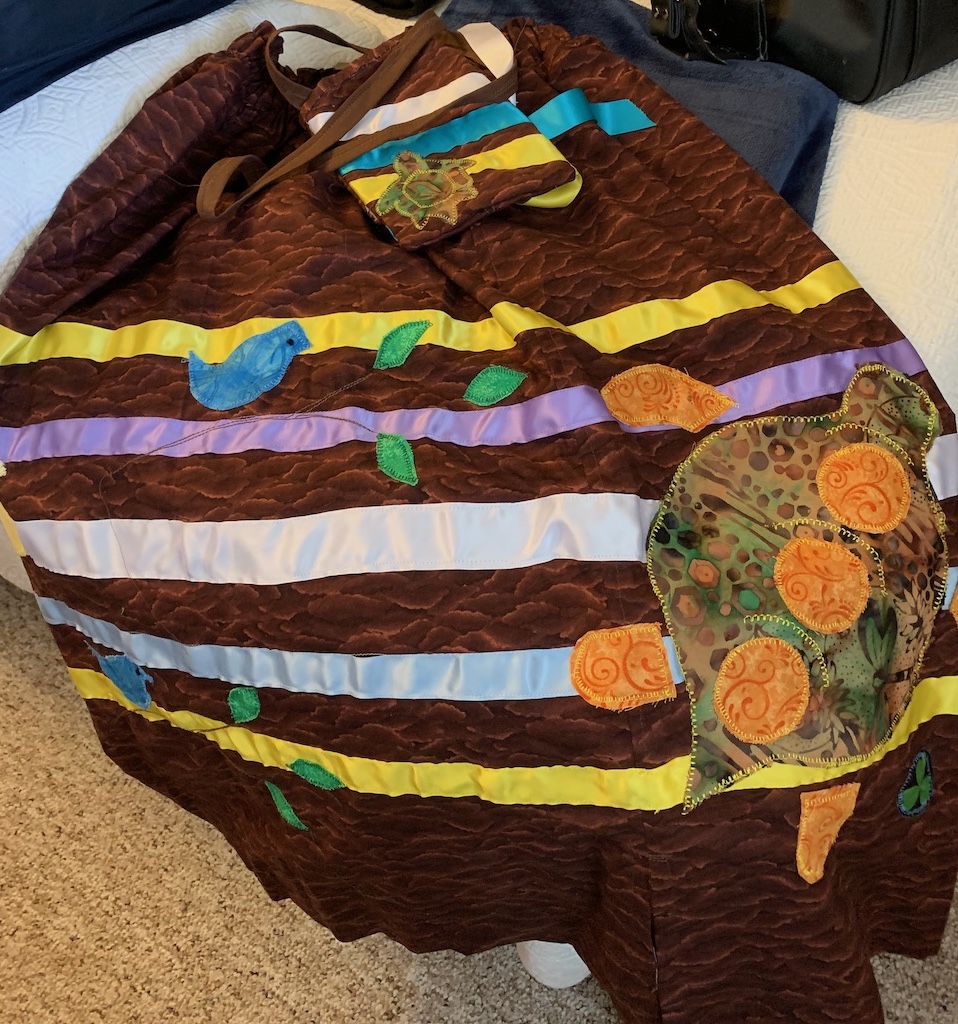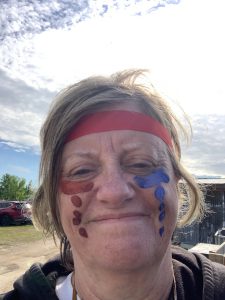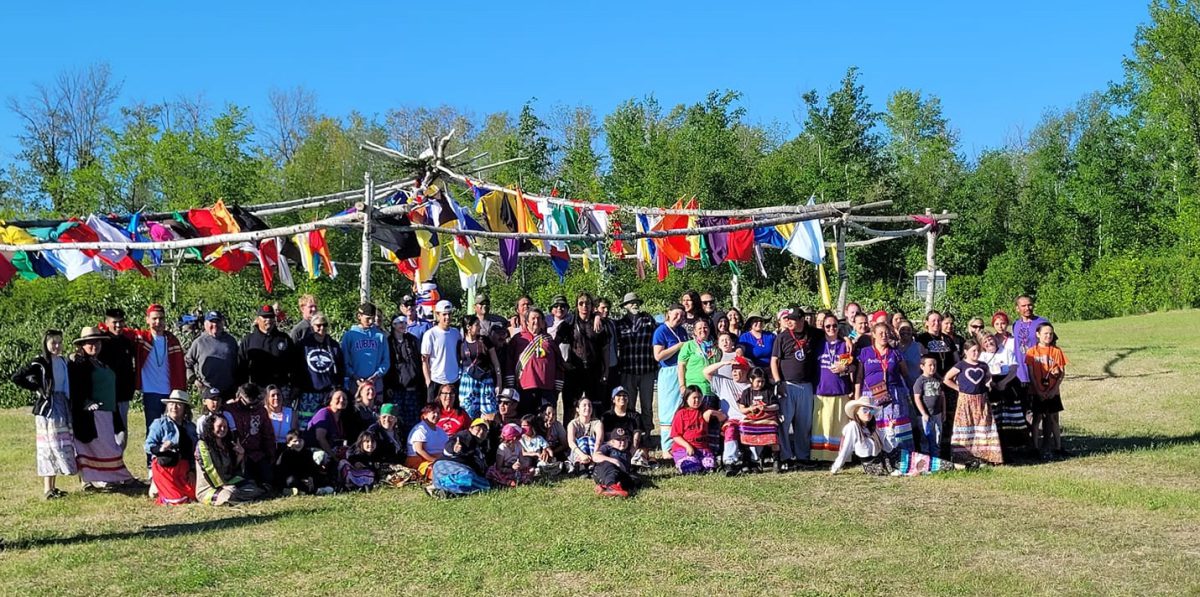Today, I write from a warm, sunlit corner of my parent’s deck in Powerview-Pine Falls, Manitoba.
It’s three hours from my home in northwestern Ontario and about 20 minutes from Sagkeeng First Nation, where I was a helper at a Sundance Ceremony this past weekend.
Even while I’m far away from my house and partner, feelings of “home” have been with me these last few days in ways I haven’t felt for quite a while.
Sundance is a time-honoured ceremony where people gather to pray and make personal sacrifices for healing. Each Sundance is rich in tradition and protocols vary by nation or territory.
In Treaty #1, where I attend, the ceremony is four days long, beginning with building of the arbour and other spiritual preparations that benefit dancers and helpers (Oshkaabewisag*). Volunteers go into the forest and select a large, straight poplar for the Tree of Life, and other poles to form the surrounding structure. A nest of tobacco offerings is placed at the very top and flags representing the spirit colours of the dancers are hung from the overhead trees.
People enter the arbour on Friday evening after a feast. They will spend two nights there, sleeping side by side in their “nests” and dancing during the day, often (during my dance years anyhow) in the blazing hot sun. Dancers make the sacrifice of not having any food and water during this time to help them heal, be open to visions and spiritual direction, or to fulfill a dream.
This is my highly simplistic description and I recommend you offer tobacco to an Indigenous Knowledge Keeper to explain if you want to know more. It is not my place to give teachings and I do not speak for anyone but myself.
So if I’m not the expert, why am I writing about this?
I love to write about beautiful things, how they impact me but also the world around me.
Sundance is, indeed, a beautiful thing.
I am not Indigenous but have been welcomed warmly into this ceremony since I began as a helper around 2012. In my third year of attending the ceremony, I had four vivid dreams that I would be dancing the next year. I fulfilled my commitment, dancing from 2015 to 2018. This sacrifice strengthened my body and spirit in indescribable ways.
But that is another story for another time.
This weekend, the concept of “coming home” rose up amidst feelings I have been experiencing of being “displaced” in the tight knit Ontario community my partner and I moved to six years ago.
Because of the distance and move to another territory (Treaty #3), I have also felt a little disconnected from my Sundance family. The three-hour drive in often treacherous conditions has made it more difficult to attend preparation meetings and sweat lodges. I haven’t been able to show up the way I always have, doing the work that I feel is mine to do as a helper.
I finished my final year as a dancer travelling from Kenora to Sagkeeng. I went to be a helper in 2019 but something felt off, which may have been more about me resettling into the helper role after being a dancer – who was helped – for the past four years. Regardless, I was slightly relieved when the pandemic cancelled the ceremony in 2020.
The isolation of the pandemic, heightened by the loneliness and seclusion I have been feeling in my new hometown, made me hesitant to leave the house and go anywhere. I simply can’t endure feeling any more unwelcome than I already do.
So for this and various other reasons, I didn’t make it back to the ceremony until 2023.
My attitude that year was to just show up without any expectations and see what happened. I was greeted warmly and handed a fan early in the ceremony to help work on people going to the Tree of Life for healing. This was a first for me. I was humbled.
I was then asked to help in the Medicine Lodge. There, I couldn’t hide from the fact I didn’t have a clue what I was doing. I listened, learned, watched others and did what I could to support dancers who were suffering terribly with the temperatures well above 30+ Celsius.
We are told that there are no mistakes. We are just asked to do our best and move on with teachings we receive when we need them. Those words rang through my ears throughout the long, hot day. Again, I was humbled, but left with a full heart and a greater commitment to return the next year.
Despite that, my nervousness rose up again this year as the date for Sundance approached.
Then, something shifted. It may have been thanks in part, to my beloved mother. She had a seamstress she knows make me a new ribbon skirt, required attire for those who identify as female for the ceremony.
This gift was layered with many messages.
When I first started attending sweat lodges and ceremonies, it was a source of amusement to much of my family. It was hard for me to diffuse their humour and confusion as I wasn’t even sure why I was doing it myself. My mother was often horrified when I walked into their house after ceremony, dirty, sunburned and exhausted.
Apparently, she had been paying attention to more than my need for a shower. She had noticed the skirt I’d been wearing for many years was torn and in need of repair – or replacement. She also knew my clan, my spirit helpers and colours, and shared all that information with the woman she asked to make me a new skirt.
The seamstress wasn’t Indigenous but sought guidance to make sure she was doing it right. Again, there’s no right and wrong – or at least, most mistakes can be forgiven. But I was comforted that she cared enough to ask these questions.

My interest in Indigenous ceremonies began while I was researching a book about environmental racism, and another writer I knew invited me to attend a sweat lodge. Having severe claustrophobia and anxiety, I was nervous as hell. Still, I pushed on because I wanted to find some truths.
My friend did her best to prepare me. She mentioned the location for the lodge, and I was aghast to learn it was close to my old hometown and the First Nations community I had lived next to, and largely disregarded, while growing up.
I managed to make it through the sweat but was surprised when the Elder in the lodge told me to pass tobacco for a spirit name. My friend and I had laughed about this on the drive out — how people show up at a lodge for the first time expecting a name. She instructed me that would come but I had to do some work first.
I was frightened and didn’t feel I was ready to receive such an honour, but the name came to the Elder in a dream. In English it is Four Directions White Thunderbird Woman.
I became immersed in ceremonies for the next few years and increasingly had opportunities to sit side by side with people I had never thought much about for a lot of my earlier life.
I was also learning that many of the privileges I enjoyed growing up were at the very high cost paid by the neighbouring Sagkeeng First Nation. The mill, where my father worked, had polluted their water, decimated commercial fishing, and wiped out natural food supplies through clear cut timber logging, multiple dams, roads, and water pollution.
When I sat in sweat lodges with people from Sagkeeng, I was filled with shame as I heard their stories of Indian Residential Schools, colonization, enforced poverty, and other losses related to Canada’s efforts to remove Indigenous people from the land and the way of life that has sustained them since time immemorial.
How didn’t I know any of this?
Fast forward to our move to a small insular community in Northwest Ontario in 2017. Not having lived here my whole life as many have, finding belonging and community has been difficult, despite putting myself out there and making contributions in the ways I’ve learned as a helper. It’s been tough and very lonely.
“We are all related” are words I often hear in ceremonies. I carry this with me more and more into some of the difficult conversations I’ve started or been a part of.
When I unwrapped that beautiful ribbon skirt and saw my mother’s joy in giving me this gift, I felt I was also being given a strong message of where I was supposed to be in the early days of June. If this was that important to my 85-year-old mother, surely, I could get out of my own way and show up. My mother knows me like no one else. I think she knew I needed the ceremony – even if I felt like it didn’t need me.
I arrived very early Saturday morning and the first person I met was our head Ishkaabe Ikwe (Helper Woman). She wrapped her arms around me and uttered those words I have been longing to hear.
“Welcome Home”.
I heard them again, not long after from our Sundance Chief.
Over and over throughout the next two days, those words came to me in different ways from different people as I fulfilled my duties as a helper. I noticed how things that had once terrified me, for fear I would do something wrong, were suddenly less frightening.
All the anxieties I’d been feeling about attending the ceremony disappeared the more I heard those two words and the long steady embraces that accompanied them.
Just do the best you can also echoed through my ears and settled in my heart as I offered my love, energy and strength when and where it was needed.
We do not share the stories of others or take any photos during the Sundance ceremony.
I can only share what I heard and experienced. A voracious notetaker, I often wished I had my journal while others spoke but was grateful to be attentive without any distractions.
I listened carefully.
I heard how we must not be afraid to speak our own truths and how we all need to raise our voices without apology. This gave me strength for the work I do in my new hometown, to be braver in seeking both justice and belonging and to hear everyone. We all have a story.
Many talked about how we must learn to let go of those things that aren’t serving us in any way and are not ours to carry. I spent time praying to the Tree of Life to release me of burdens that are no longer mine.
I saw people make sacrifices and I watched as they were surrounded and lifted up by unconditional love.
There was no judgement. There was no one who did not belong. Including me.
I danced and prayed to the Tree of Life to help me let go of the pain and longing about finding home in my new town.
I felt the aching loosen from around my heart and drift up, up and away – like a Thunderbird rising through the highest branches of that tree.
In that moment, all the love I felt in the ceremony – and in the places where I live, among the people there – replaced the longing and loneliness.
I am not alone. I probably never was.
It was like a voice, maybe my own, whispered in my ear one more time.
And I knew it to be true.
Welcome home.

*Ojibwa Peoples Dictionary – the slang often used for helper is ‘scabe’.

